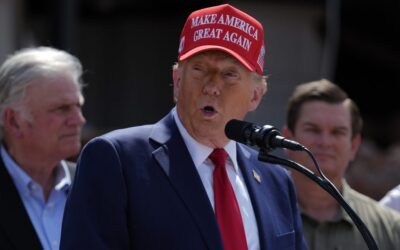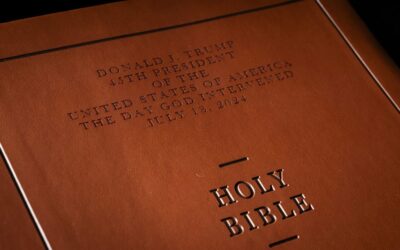
Former US President and 2024 Republican presidential candidate Donald Trump holds a big and a small box of tic-tac to illustrate inflation outcome during a town hall event at Dream City Church in Phoenix, Arizona, on June 6, 2024. (Photo by Jim WATSON / AFP) (Photo by JIM WATSON/AFP via Getty Images)
If elected, Donald Trump has vowed to implement a 10% tariff on imports, deport undocumented immigrants who make up a huge percentage of the agricultural and construction industries, and cut corporate taxes. Experts say these plans would be inflationary and cost Americans thousands of dollars per year.
Former president Donald Trump has repeatedly made vague promises to bring down prices and save Americans money if he’s elected in November, but Trump’s economic proposals would actually cost everyday Americans more money and cause inflation to rise, according to an assortment of economic experts.
Three significant facets of Trump’s proposed economic strategy for a potential second term would likely raise costs for taxpayers and ultimately increase inflation, new reporting shows.
Economists point to Trump’s proposed tariffs on imported goods, his widespread deportation plan, and desire to pass large tax cuts for corporations as risky moves for the US economy—and even proof that Trump’s understanding of basic economic principles remains limited.
Just this week, 16 Nobel Prize-winning economists joined forces in a letter to warn Americans about the potential inflationary impacts of a second Trump presidency. The group called Trump’s proposed plans “fiscally irresponsible” and said the former president’s outlined adjustments would have a “destabilizing effect” on the US economy.
“While each of us has different views on the particulars of various economic policies, we all agree that Joe Biden’s economic agenda is vastly superior to Donald Trump,” the letter read.
Trump’s plan shows a misunderstanding of how tariffs work
Tariffs, or taxes paid by importing companies on foreign-made products, have been a central talking point of Trump’s proposed economic policy.
Trump first announced a proposed 10% tariff on all imported goods back in 2023. His campaign has repeated the proposal in the months since, doubling down on the idea that the new tariffs would be applied on top of existing tariffs.
The former president’s goal, presumably, is to prevent foreign companies from “flooding” the US market with foreign-made products and reduce these companies’ profits while encouraging Americans to look for domestic-made alternatives. Trump has also bragged about tariffs forcing foreign governments to pay the US “tremendous amounts of money.”
But some reports say Trump demonstrates a fundamental misunderstanding of how tariffs actually work. Import tariffs are typically levied against importing companies—usually domestically owned—and paid by those companies in the form of taxes when imported products pass through US Customs. Research from the National Bureau of Economic Research shows that the actual price increase associated with tariffs on imports “falls largely on the United States,” not on exporting countries.
This increase in taxes for US importers would translate into higher prices on goods for ordinary Americans. A report from Moody Analytics predicts that middle-income households in the US would pay around $1,500 more each year to account for higher taxes on imported products. This includes goods like food, electronics, clothing, cars, pharmaceuticals, gas and oil, furniture, and recreational items.
Trump has also claimed that his tariff plan would allow the US to economically compete with China by pushing up tax rates. In reality, some 60% of imported products come to the US by way of “friendly trading partners” like the United Kingdom, Canada, Mexico, the European Union, Japan, and South Korea—so the former president’s 10% plan would not be focused on pushing back against China.
The former president has also suggested that he’d be open to eliminating the US income tax and replacing it exclusively with tariffs. An economist from the Center for American Progress Action Fund said this proposal would lead to soaring prices and ultimately cost the typical US family $5,000 per year.
Mass deportations would raise food and housing costs
Trump’s proposed deportation of immigrants could put the US economy in further turmoil by drastically reducing the workforce, economists argue.
Reporting from the New York Times last year outlined Trump’s goals for deporting undocumented immigrants “by the millions” and even detaining them in camps while awaiting processing. Beyond humanitarian concerns, the massive deportation goal would significantly impact the US labor force.
Data from the Pew Research Center shows that some 7.8 million undocumented immigrants contributed to the US labor force as of 2021. Cuts to this force in the numbers Trump has promised could leave millions of jobs unfilled, demand for products soaring, and prices higher for US consumers.
The agricultural and construction sectors, which are largely kept afloat by the work of non-native-born workers, would be particularly affected by Trump’s deportation plans.
Immigrant farm workers account for around 73% of agriculture workers in the US, providing a critical link in the supply chain for dairy products, fruits and vegetables, and other crops. In the construction field, immigrants make up nearly a quarter of the workforce—and this number continues to climb, while US-born workers join the industry at a slower pace.
Should the labor force in these sectors shrink, farmers and construction companies would be unlikely to find ample numbers of native-born workers to fill these jobs, due to low wages and challenging working conditions.
Americans would, in turn, see changes in cost at the grocery store and across the housing market, as the rapid reduction in both agricultural and construction workers could lead to significant downturns in supply of food and new housing.
A report from the Peterson Institute expands on the dangers of significantly slashing the immigrant labor force, even signaling that such cuts would lead to fewer jobs for US-born workers. The report cites research from the University of Colorado: “They imply that for every one million unauthorized immigrant workers seized and deported from the United States, 88,000 US native workers were driven out of employment.”
If Trump’s proposed deportation policies came to fruition, this would mean 263,000 fewer jobs for native US workers per every three million deported workers.
And an estimate from the Center for Migration Studies of New York predicts that mass deportation could trigger a new real estate crisis, as some 1.2 million mortgages held by households where undocumented immigrants reside would suddenly be in jeopardy.
A ‘Republican Sweep’ could make inflation worse
Economists also point to Trump’s tax cut proposals as a warning sign for further inflation in the case of a second presidential term.
The former president and his advisors have promoted the idea of further slashing corporate tax rates to some 15% from their current 21%. This move would increase the federal deficit by some $520 billion, according to analysis by the Tax Foundation.
And while Trump is also reportedly considering a tax cut for middle-class Americans, this move could ultimately prove inflationary. As a report from Vox explains, a significant boost in Americans’ post-tax spending power could “dramatically boost their purchases of goods and services.” In turn, the basic principles of supply and demand would apply: increased demand without increased supply at an equal rate would signal higher prices for consumers.
A new report from Moody Analytics predicts that inflation would be especially high in the case of a Trump presidential win coupled with Republicans winning control of Congress—a scenario dubbed “the Republican Sweep.”
In their Moody report, three economists forecasted a consumer price inflation of 3.6% in 2025 if the Republican Sweep were to occur—an increase from 3% in 2024.
“The Federal Reserve, which is focused on labor costs and inflation, may feel compelled to resume its rate hikes, or at the very least wait longer to cut rates. Recession becomes a serious threat once again,” they wrote in response to the possibility of Trump’s financial policies taking effect.

Here’s what Trump promised to do on ‘Day One.’ Now that he and Republicans have total power in DC, will he?
The president-elect should be able to, in theory, implement his “Day One” plans. The big question is – will he actually do what he’s proposed? Or...

Youngkin to visit Trump in Mar-a-Lago
Virginia’s governor is joining other Republican governors from around the country for a visit with the president-elect. Virginia Gov. Glenn Youngkin...

Trump is widely expected to prematurely declare victory regardless of the vote count
Political experts and campaign officials alike are expecting Donald Trump to declare victory on Tuesday night before the final results will roll in....

Dozens of ex-Trump administration officials have spoken out against him or oppose his campaign
Dozens of former Trump administration officials — including his former VP Mike Pence, former Chief of Staff John Kelly, and two of his former...

Opinion: How Trump exploited a willing media to convince Americans that nothing matters
More than nine years after he launched his first campaign for president, much of the media continues to struggle with how to cover Donald Trump. In...

Trump’s former chief of staff says the former president praised Hitler and would rule like a ‘fascist’
“I need the kind of generals that Hitler had,” Trump reportedly said in a private conversation in the White House. And in an interview with The...





